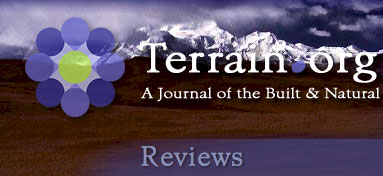
 |
|
|
Home in All the Lush Senses Simmons B. Buntin reviews Phantom Limb: Essays, by Theresa Kishkan
So it is with Theresa Kishkan and Phantom Limb (Thistledown Press, 2007), a collection of 15 short essays that span Kishkan’s British Columbia while also venturing afield to places like Utah and Ireland. Like Alison Hawthorne Deming and Scott Russell Sanders, Kishkan writes from a core of earth-based wisdom—a common sense that speaks to community, conservation, and compassion. She is a liberal essayist in the base and best definitions of the word: “free from prejudice or bigotry; tolerant” and “given freely or abundantly; generous” and “not strict or rigorous; free; not literal.” I am drawn to people with an environmental and community ethic, who believe in family and realize that family takes many forms, and who value free thought and the right to express thoughts in eloquent and sometimes daring, even painful ways. Kishkan is this type of person, I am sure, because the essays collected in Phantom Limb are full of the experiences, wonderfully told, of a woman discovering herself and her place among environments and cultures that cannot help but define her. In “Autumn Coho in Haskins Creek”—the first essay—for example, she writes, “Although our lives change, loved ones die—several good friends, a neighbor, and even one of the dogs who watched the fish with us last year died in the spring, her body now buried under old cedars in our woods—we need the constancy of place to anchor ourselves like a small boat in wild waters.” In addition to penning insights that are universal but far from preachy, Kishkan also fills the essays with lovely language, painting the landscape without drenching, providing the light of hope on the horizon. “Autumn Coho in Haskins Creeks” provides the first of plenty of examples, my favorite near the end, where she describes coho salmon in winter: “There is a radiance in their color and shape, purpose in their movements; this culmination of a journey from as far away as the north Pacific to this small waterway, is proof that home—its scent and texture—has a place in deep memory.” Memory plays another role too, in this collection and for this author, for I had the opportunity to read three of these essays—“An Autobiography of Stars,” “month of wild berries picking,” and “Well”—before they were published; and then after, too, for they originally appeared in Terrain.org. Disclosure isn’t necessary, nor is any conclusion that exposure to Kishkan before receiving the book makes me like it better. It undoubtedly made me eager to read the book, since I enjoyed those three essays immensely from the get-go. Yet whether by reading an essay here or there or by settling into the book, following essay after beautiful essay until the 168-page book is complete, the outcome is the same: a sense of wonder and honest questioning and discovery, superbly written. I set out to list the essays I liked the most, but it differs little from the table of contents. One, however, remains with me well after finishing the book, and that is “Coltsfoot,” an essay that braids coltsfoot, a plant blooming on the Sechelt Peninsula, with Kishkan’s coming of age with her horse. Perhaps this particular essay whispers like a wise friend in my ear because I am the father of two daughters, not so far away now from their teenage years, their first experiences with boys. In introducing us to her own colt, she begins:
The essay continues with the author’s experience of turning her colt into a saddle horse, and of turning herself into a young woman. They are intertwined. “A girl longs for physical affection,” she writes, “and my horse provided the warmth and close intimacy that was lacking in those early teenaged years.” The intimacy continues even after the horse rears and she falls, breaking her pelvis and spending two months in the hospital:
Other essays continue to resonate, as well, like “Scouring Rush,” full of poetic language such as, “How lovely a word: estuary. The s sound at the front of your mouth, then the wide opening. The rush of vowels. The tidal swoosh.” And “Drunkards Path,” about quiltmaking and Mormonism and the author’s brief stint in Provo, in which she writes, “Imagine a woman’s desire to make a first quilt, having admired them in the houses of others or in books. Perhaps she’d moved to a new place and discovered a quilter’s guild, a group of women meeting regularly to sit in a circle of flying hands. Perhaps she’d felt a need, as strong as hunger, to make something of beauty to take her out of her life for some time each day, or more deeply into it.” I discovered that the title essay, “Phantom Limb,” is best not read with an open office door during lunch hour. Finally I had to close the door to hide my wet cheeks, for anyone who has lost a dog before—and likely those who haven’t—will be greatly moved by this fine essay. A sample:
It would not be true to say that Theresa Kishkan has a striking voice, an angelic voice, a voice so bright you cannot look directly at it—though the six-part “Six Stones on a Summer Windowsill” is as fine a lyrical essay as I’ve read in quite some time. Rather, she has a comfortable, wise, and elegant voice that reminds me of home, home in all the lush senses, full of texture and history and meaning. Phantom Limb is a wonderful collection of honest essays that convey not only sense of place, but also sense of worth and compassion. It belongs on the favored bookshelf yet deserves to be passed to an old friend, who will thank you for years.
|
|
||||||||||||||||||||||||||||||||||||||||||||||||||||||||||||||